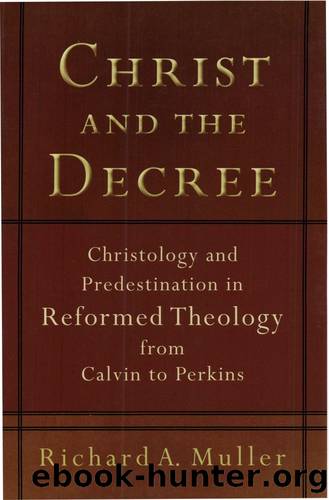Christ and the Decree: Christology and Predestination in Reformed Theology from Calvin to Perkins by Muller Richard A

Author:Muller, Richard A. [Muller, Richard A.]
Language: eng
Format: epub
ISBN: 9781441239075
Publisher: Baker Publishing Group
Published: 2008-09-01T00:00:00+00:00
V
REFORMED THEOLOGY IN HEIDELBERG: ZACHARIAS URSINUS AND JEROME ZANCHI
1. URSINUS ON CHRIST AND THE DECREE
In 1561 elector Friedrich III of the Palatinate commissioned two young theologians, Zacharias Ursinus (1534-1583) and Caspar Olevianus (1536-1587), to prepare a catechism for use in his dominions.[1] The catechism they produced, an epochal work in itself, became the basis for Ursinusâ highly influential Doctrinae christianae compendium.[2] More than any other Reformed systemâwith the possible exception of Bullingerâs Compendium christianae religionisâthe Heidelberg Catechism and Ursinusâ Doctrinae christianae compendium stress the economy of salvation. In this economy Godâs electing will and his saving work in Christ must conjoin.[3]
Like Calvin, Ursinus introduces his doctrine of the mediator with Anselmâs argument on the necessity of mediation. âA mediator is required who is both God and man,â[4] who as man must be like us in all respects but for sin and as God must be so united with human nature as to sustain his humanity in its bearing of the infinite punishment of sin.[5] This doctrine of the mediator has as broad structural implication for Ursinusâ system as it had for Calvinâs Institutes. Ursinus placed prior to it only the doctrine of man, his Fall, and his sinful estate. The doctrine of the mediator precedes and governs the doctrine of the covenant and the Gospel, the doctrine of faith, and the credal exposition. Indeed, Ursinus treats of the questions concerning God, creation, and providence between his introduction of the concept of mediation and the Christology proper. All the credal articles belong to the faith âby which we are made partakers of the mediator.â[6]
The mediator, Jesus Christ, is the Son of God. The Son mediates since the Father works not through himself but through another. The Father âis sent by no one, but himself sends the mediator.â Neither can the Holy Ghost be mediator since he is âsent by the mediator into the hearts of the elect.â The Son is therefore uniquely the mediator.[7] He is our comfort since he is the one sacrifice sufficient for the expiation of sin, the true revealer in that sacrifice of the justice of God, the one who gives assurance of eternal life. âThe doctrine of the mediator is the foundation, and substance, of the doctrine of the church.â[8] Christ is both mediator and medius because he reconciles God and man and, as the God-man, stands between and joins the two extremes,[9] reconciling the eternal and the temporal, the infinite and the finite.
Christ accomplishes his work by means of a covenant, âinasmuch as every mediator is the mediator of some covenant, and the reconciler of two parties.â[10] The covenant as described by Ursinus, relates in one formulation the concepts of foedus dipleuron and foedus monopleuron:
[the covenant] is thus a mutual pact between God and men, in which God confirms to men that he will be merciful to them, remit their sins, give unto them a new righteousness, the Holy Spirit, and life eternal, through and on account of the Son, the Mediator: in turn men
Download
This site does not store any files on its server. We only index and link to content provided by other sites. Please contact the content providers to delete copyright contents if any and email us, we'll remove relevant links or contents immediately.
The Lost Art of Listening by Michael P. Nichols(6462)
Why I Am Not A Calvinist by Dr. Peter S. Ruckman(3767)
The Rosicrucians by Christopher McIntosh(3046)
Wicca: a guide for the solitary practitioner by Scott Cunningham(2702)
Signature in the Cell: DNA and the Evidence for Intelligent Design by Stephen C. Meyer(2495)
Real Sex by Lauren F. Winner(2466)
The Holy Spirit by Billy Graham(2408)
To Light a Sacred Flame by Silver RavenWolf(2350)
The End of Faith by Sam Harris(2279)
The Gnostic Gospels by Pagels Elaine(2023)
Nine Parts of Desire by Geraldine Brooks(2002)
Waking Up by Sam Harris(1953)
Heavens on Earth by Michael Shermer(1950)
Devil, The by Almond Philip C(1896)
Jesus by Paul Johnson(1882)
The God delusion by Richard Dawkins(1843)
Kundalini by Gopi Krishna(1821)
Chosen by God by R. C. Sproul(1754)
The Nature of Consciousness by Rupert Spira(1687)
